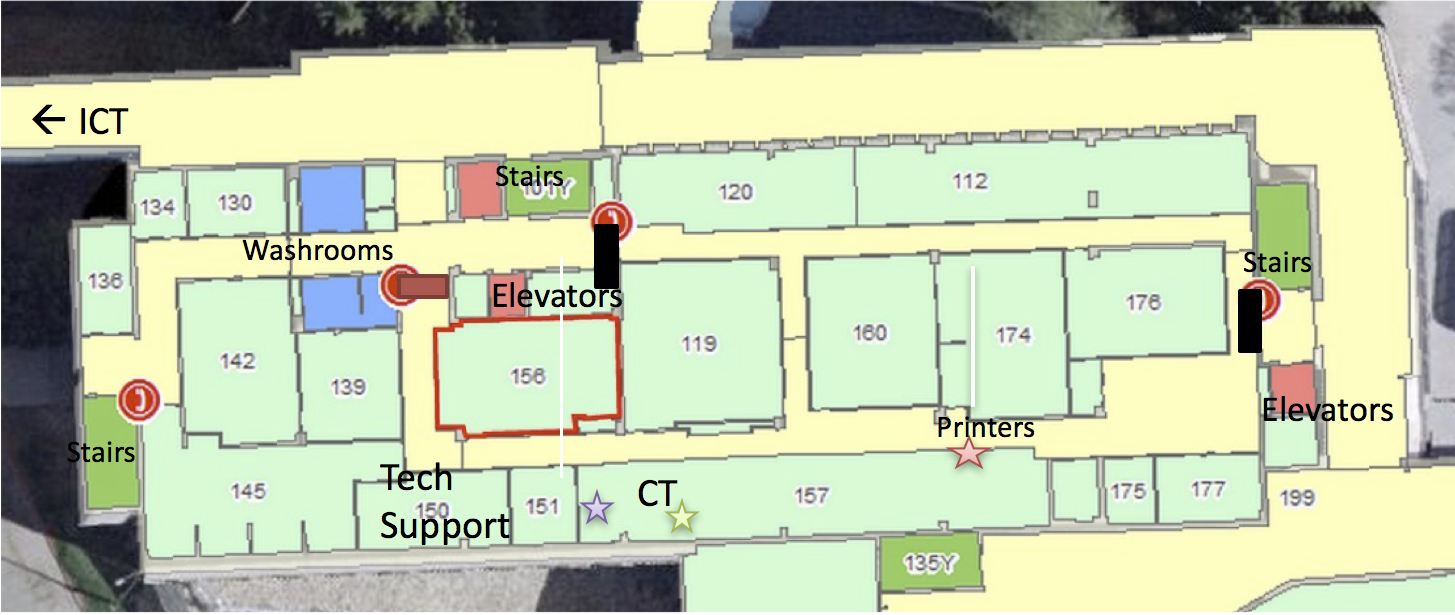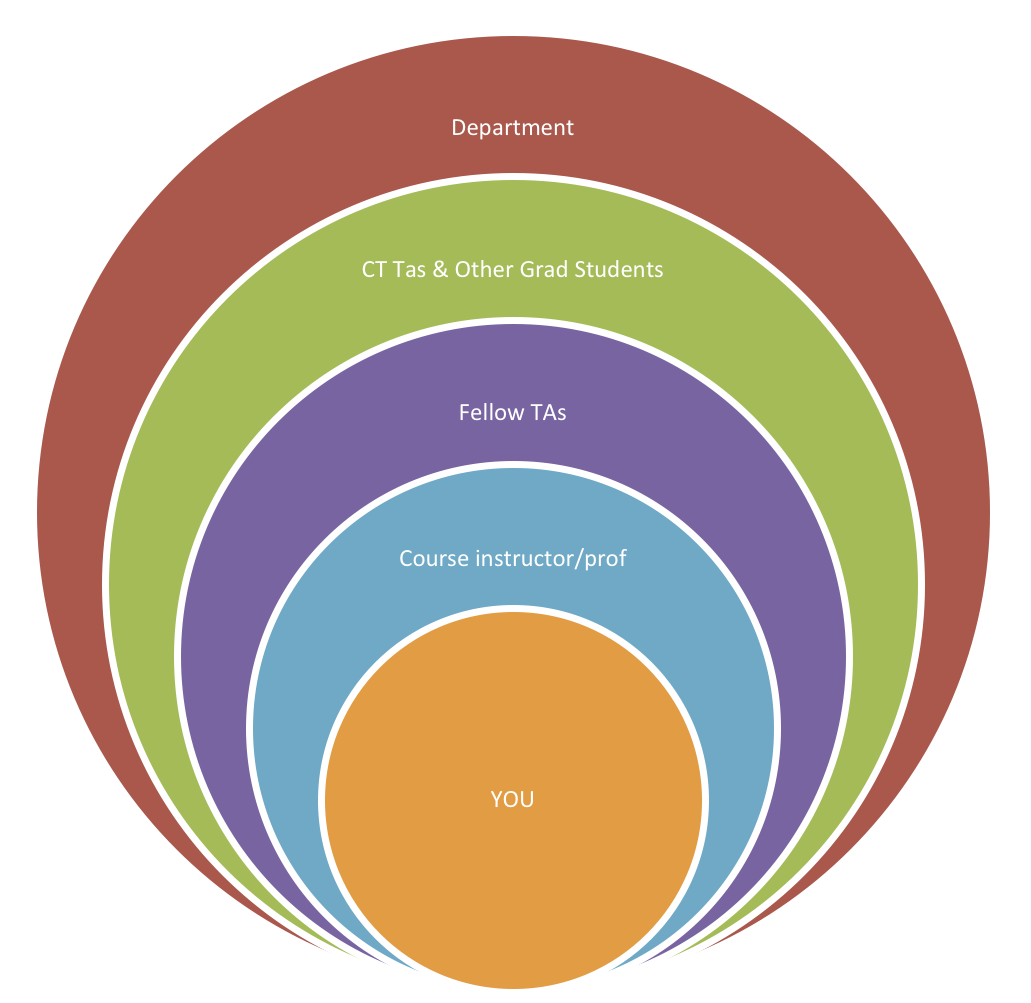TA Orientation

Jan 9th, 2020
Adapted from material originally developed by Andrew Kuipers, Leanne Wu, Jonathan Hudson, and Tyson Kendon and Zain Rizvi
About Me
- B.Sc. Simon Fraser University (2009-2014)
- M.Sc University of Calgary (2015-2017)
- Ph.D. University of Calgary (2017-20XX)
TA in Residence
Help and mentor teaching assistants
Observations:
- I'll be visiting you in tutorial to observe your teaching style and give feedback on what you're doing well, and what needs improvement.
- New TAs get priority, but you may also request to be observed earlier
All feedback is confidential
Only intended to be an instrument for improving your teaching & classroom interactions. Neither the department, your supervisor nor the course instructor will be informed of any results
TA in Residence
Before the visit
- I will contact you via email to determine when I should visit
- We will pick a lab that is representative of a “normal lab”
- We will talk about what you hope to get out of the visit
During the visit
- You may let your students know that I’m visiting
- Do your lab as normal
- Don’t pay me any attention
After the visit
- We meet to talk about how the lab went, my observations and your thoughts. What parts work well? What parts should be different?
- We talk about follow up, things to focus on and if I should visit again in the future
Your Job as a TA
Generally
- Who's been a TA?
- Who's had a TA?
- Who's had a memorable TA?
What is a TA?
- What does the instructor feel the TA does?
- What do the students feel the TA does?
- What do you feel the TA does?
Your Job as a TA
What do TAs do
- Prepare Tutorials
- Deliver Tutorials
- Mark Assignments/Exams
- Give Out-of-Class support
- Continuous Tutorial (CT)
- Help fellow TAs
(some combination of these)
Preparing Tutorials
Meet with course instructor regularly
- Announcements to be made in class
- Full material or rough outline of tutorials
- Progress in lectures vs progress in tutorials
- Questions / concerns to be raised with instructor
Know the course material
- Enough to answer most questions
- Work through sample problems
- Know the technology
Preparing Tutorials
Plan your tutorials
- Budget your time (allow for derailment)
- Practice your material
- Create variety
- Find resources (Instructor, other TAs, the web)
Develop supporting materials
- PowerPoint, Examples, Quizzes, Code, Props, Etc.
- Arrange for Projectors, Laptops, etc.
Delivering Tutorials
Motivate the material
- Start with a question to answer or task to accomplish
- Give students a roadmap
Engage the students
- Answer Questions
- Don’t just answer questions
- Ad hoc group work
- Impromptu tasks
- Group discussions
Be flexible
- Discovery learning is good. If no time, answer after tutorial or via email.
Delivering Tutorials
Admit when you don’t know something
- An opportunity to demonstrate use of resources (language API, web tutorials, problem solving, debugging)
- The right answer late via email/message board is better than a wrong answer
Make Mistakes
- Don’t be defensive, take them as a learning opportunity for everyone
Let your passion be infectious
- Students can tell!
- Draw from your own experiences
- Motivate the material (your own research, future courses, the real world)
Delivering Tutorials
Confidence is important
- Be ready
- Be early
- Have good posture
- Talk loudly, clearly and slowly
- Make eye contact
Grading
Prepare beforehand
- Make sure you know what the assignment requires
- Build test cases, sample proofs, demo questions
- Try it out yourself (if you have time)
It WILL take a lot of time!
- 5 ~ 6 hours per tutorial section
Have a detailed marking guide
- Often provided by the course instructor
- If not you’ll have to make your own
- Have a clear quantification of assignment grade
- Directly reflects assignment description
Grading
Be prepared to defend the mark you give
- Have notes
- Some students will complain about their mark
- Admit to mistakes, but be firm otherwise
- Can always refer them to the course instructor
Grade fairly and objectively
- Remember students are learning – they won’t be perfect!
- Look at a sample of submissions before you start
- Track your own marking habits
Provide written feedback
- Some aspects of assignment may be subjective
- Written comments in code (if applicable)
- Justification of numerical scores
Out of Class support
Most of you will be expected to interact with students outside of class:
Set and follow ground rules
- Answer emails only during set times (or set a time limit)
- Encourage students to prepare and avoid last-minute crises
- Set email guidelines
- Office hours (relatively rare)
Continuous Tutorial
Be ready for the time
- Have your reading or other work ready
Be ready for the students
- Look available and attentive
Be organized and fair
- Keep a first come, first served list
- Limit the amount of time each student gets in a sitting
Technical Stuff
AV Equipment
CPSC Labs:
- Everything is there
- Windows Lab: Click the “Projector On” button
- Linux: sudo projector –on
- Questions go to tech support (MS 773)
Technical Stuff
MyUofC
- Organize your pay and check your pay stubs.
- Get your Tax Information (T2202A & T4A)
- Find your class roster
Technical Stuff
D2L
- Manage assignment submissions
- Enter Grades / Give Feedback
- Contacting students
- Content management
- Group management
Technical Stuff
CPSC Technical Resources
Building your own webpage
Department servers
Tech Support Help (start support ticket via) cpschelp@ucalgary.ca
Technical Stuff
The Physical Dropboxes
- Sign a key out from the main office (ICT 602)
- 1st floor Math Science
- Open the two locks, open the holding bars then open the row for your lab.
- Lock everything back up
- Return the key (promptly).
Technical Stuff

How to be a Good TA
Your teaching team

How to be a Good TA
Good and Bad TA Habits
Good:
- Speak clearly
- Be on time
- Capture the students’ interest
- Be friendly
- Encourage participation
Bad:
- Talk to the board
- Being dismissive or condescending
- No feedback on assignments
How to be a Good TA
Challenges of being a TA
- Talky Students
- Quiet Students
- Smart Students
- Cocky Students
- Cheating
- Conduct in lab
- Conduct out of lab
- Instructor expectations
- Time management
- Marking
- Conflict of interests
Diversity
Your sections will be diverse! Some of the diversity groupings that are the most obvious may be:
- Gender
- Country of origin/ethnicity
- Age
No assumptions about the performance or abilities of any student based on these factors!
You’ll note that we are also a diverse group… so remember assumptions may go both ways.
Diversity
- Try to restate important points different ways when delivering tutorial material
- If you’re not sure, prompt students to restate material in their own words
- Each student will have different needs from you
Students also have diverse needs
Communicating with Students
When grading, more feedback is always better than less
Tell them about your experiences inside and outside of school
- Stories from your graduate career, industry, or previous studies are very useful to motivate why they’re learning the material we’ve chosen
Don’t be too shy to talk about yourself and your research
- What you’re excited about you can get them to be excited about
Managing your workload
12 hours a week (average)
Balance
- Know when your TA duties will be heavier (ie. grading)
- Know when your research duties will be heavier
- Know when other commitments (coursework, service) are required
Teamwork
- Not a competition!
Expectations
- Don’t surprise the course instructor or your students
Policies
A set of consistent rules which you advertise through the semester
- Conduct during the tutorial
- Guidelines for how to contact you and how you will contact them
- Expectations for assignments/exercises/demos
Reinforce these throughout the semester
Your first tutorial
The following may be items you are asked to cover during your first tutorial:
- Account set-up
- UNIX basics
- Follow up on lecture material
- Start working on first assignment/project
First tutorial: What sort of basic information should you give out before any course material?
Your first tutorial
- Name (MSc? PhD? Type of research)
- Course, section number
- Contact information (email/webpage)
- Availability: CT/Office hours and locations
- Policies (like)
- “I will try to return your emails within a day”
- “No food or drink in the lab”
- “Go ahead and take pictures of the board if it helps”
- Asking questions. Tutorial structure.
Introduce yourself
Your first tutorial
Before tutorial:
- What do you need to have ready?
During tutorial:
- What are the important points?
- What activities will your students participate in?
- What information do you need from your students?
After tutorial:
- What are things you need to follow up on?
- Is there anything you need to tell your teaching team?
Things that can go wrong
- You get sick
- A student gets sick
- A student gets hurt
- Lights won’t turn on
- Projector won’t turn on
- Projector won’t turn off
- Everything you ever learned about java is wrong
- You need to use the bathroom
- Your example is wrong
- Your proof is wrong
- Your math is wrong
- The instructor is wrong
- The TA in Residence Shows up
- There are no white board pens
- Someone else is in the room
- There’s a fire in the building
- There’s a fire in the room
Important Things
- Campus Security (403-220-5333) / Help Phones
- Safewalk (403-220-5333)
http://www.ucalgary.ca/security/safewalk
- CPSC Main Office (403-220-6015)
- CPSC Tech Support (403-220-6613)
http://www.cpsc.ucalgary.ca/tech_support
- UCalgary Information Technology (403-220-5555)
Important Things
- CSGS: csgs@cpsc.ucalgary.ca
- GSA: emails every Tuesday
- Faculty of Grad Studies: My GradSkills
- University’s Teaching and Learning Centre
- Student Success Centre
- University of Calgary library
- Safari: Great source for technical books
Where to go from here
Taylor Institute for Teaching and Learning
- Instructional Skills Workshop
- Other Workshops
Read
- No shortage of resources on teaching .
Practice
- Try things
- Try new things
- Try to do things you’ve learnt from past TAs
- Learn as you go
TA Workshop
By Joshua Horacsek
TA Workshop
- 1,289



